Posted 02 Jul 2025
Neurodiversity at Work: Why Inclusion Needs a Strategic Upgrade
Neurodiversity at Work: Why Inclusion Needs a Strategic Upgrade
Author: Helen Musgrove, Head of Consulting, Genius Within C.I.C.
Prefer this article as a PDF report? Just download below
About the Author
Helen Musgrove is the Head of Consulting at Genius Within C.I.C. and a Business Psychologist.
She has extensive experience helping employers around the world create more neuroinclusive workplaces through evidence-based organisational change programmes and training.
Helen is passionate about celebrating neurodiversity and empowering neurodivergent people to thrive at work, drawing on experience from her own family, as well as her professional expertise.
Prior to her career as a Business Psychologist, Helen worked for many years as a Senior Civil Servant, leading strategy and delivery of UK-wide social policy programmes to increase inclusion and support for marginalised groups.
Helen holds an MSc in Organisational Psychology, a Post-Graduate certificate in Leadership and a BSc in Psychology.
The consulting practice at Genius Within includes highly qualified Chartered Occupational and Business Psychologists, with extensive professional and lived experience on neurodiversity.
Learn more about the consulting practice at:
Introduction
Over the last few years, neurodiversity has entered public consciousness with a bang. You can’t open a newspaper or scroll through social media without it popping up, and the business world is no exception.
Employers increasingly recognise the prevalence of neurodiversity within the workforce, and happily, the value that neurodivergent people can bring to their organisation: such strengths include creativity, honesty, integrity, critical thinking and hyperfocus[1].
[1] McDowall, Doyle and Srinivasan (2024)
However there seems to be an imbalance between how organisations feel they are performing on neuroinclusion vs. how their employees feel.
An imbalance to address?
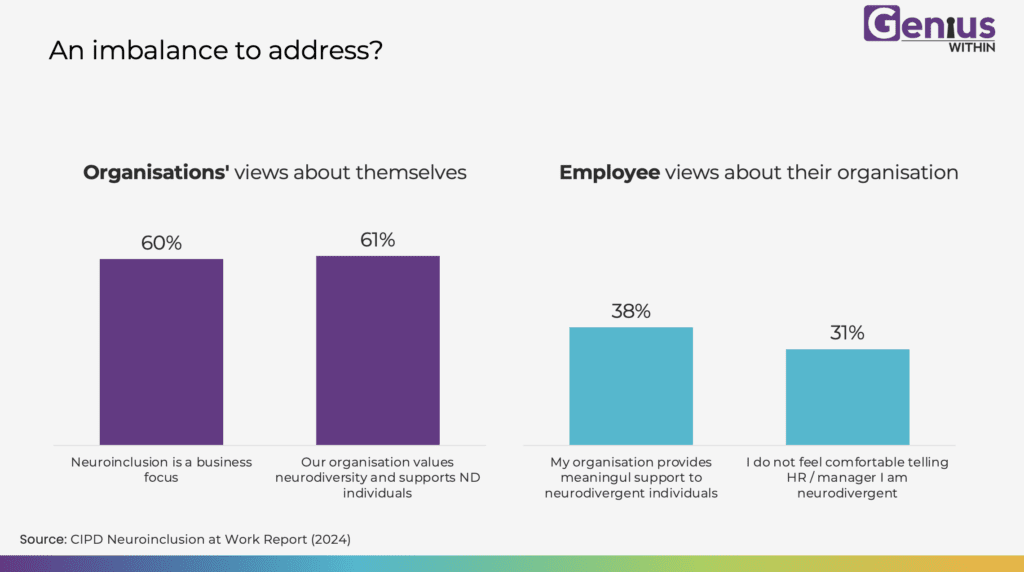
Why might there be such a disparity between the support that employers think they are providing, and how it is perceived by employees?
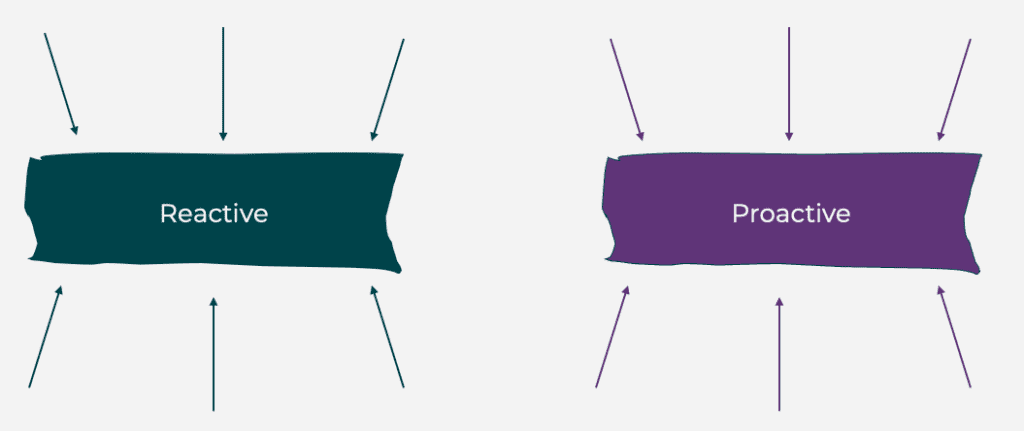
In my experience it is because support is often reactive, put in place at an individual level once something has gone wrong due to the systemic barriers that neurodivergent individuals can experience at work. This downstream intervention can be costly, both in financial terms, and in reduced productivity, employee confidence and retention. It leaves neurodivergent individuals, their managers and employers feeling frustrated, and unsure how to handle the tricky situations that can arise.
Fortunately, there is a better way!
At Genius Within, we want to challenge and support organisations to go further, moving beyond basic legal compliance, and even beyond deliberate inclusion towards systemic neuroinclusion.This means removing the organisational barriers which can hold back neurodivergent talent, and creating the conditions where people feel safe to be themselves and can meet their potential.
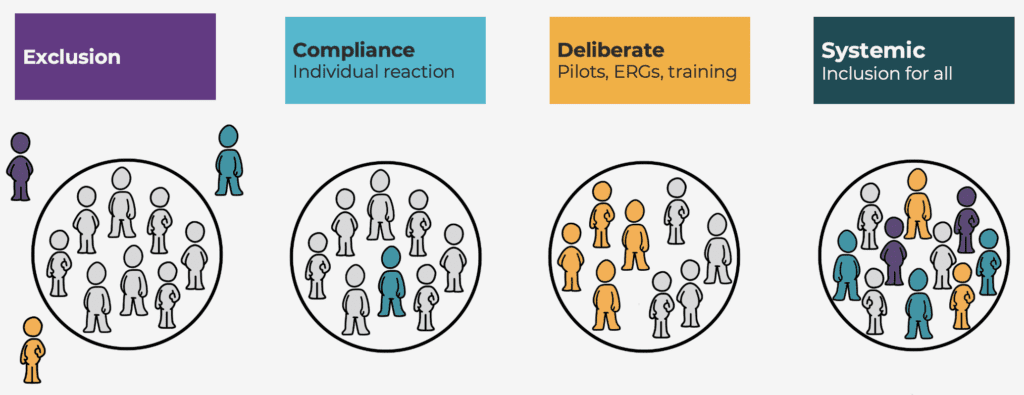
Our aim is to place the individual at the heart of an organisational approach to neuroinclusion.
Our advice to employers is to focus on three key areas, where evidence suggests there are problems that need solving, and opportunities to create real change.
1) Developing your neuroinclusion strategy to create psychological safety and a competitive advantage

Neurodivergent individuals are less likely than neurotypical colleagues to feel psychologically safe at work[2], and as referenced above, a third have not told their employer they are neurodivergent[3]. This can impact the individual’s access to support, wellbeing and performance.
[2] McDowall, Doyle and Kiseleva (2025)
[3] CIPD Neuroinclusion at Work Report (2024)
Psychological safety also predicts organisational performance, innovation and retention[4], so a lack of psychological safety is a big issue for employers as well as employees.
Research tells us that fostering psychological safety—especially for neurodivergent employees—requires system-wide strategies. These include leadership commitment, inclusive policies, line manager training, and a supportive organisational climate[5]. Embedding neuroinclusion proactively – rather than reactively – is key to sustainable workplace change[6].
If you are going to create a neuroinclusion strategy that truly meets the needs of your organisation, it needs to draw on evidence from your own people – their experiences at work and their cognitive strengths and challenges at a group level.
You may also benefit from expert advice on what you are doing well, and where there are gaps. For that strategy to have an impact, it needs to have multi-stakeholder buy-in. This includes neurodivergent employees (often represented by an Employee Resource Group) as well as the senior leaders across the organisation who can influence organisational culture, and ‘make stuff happen’.
Making stuff happen also requires a concrete plan that translates your strategy into action, and clear accountability for its delivery.
Finally, it is vital to monitor your progress and evaluate impact, refreshing your strategy to reflect your findings.
[4] Edmondson et al. (2023)
[5] Birkbeck and Neurodiversity in Business (2023)
[6] McDowall, Doyle and Kiseleva (2025)
2) Performance optimisation for neurodivergent talent
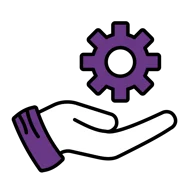
We have already established that neurodivergent people can bring real strengths to your organisation but to optimize their performance, we need to embed neuroinclusion and universal design principles across the employee lifecycle[7], from recruitment through to talent development.
[7] McDowall, Doyle and Kiseleva (2025)
Employers may be missing out on neurodivergent talent because of bias in recruitment processes.

Once in role, neurodivergent employees are less satisfied with their careers than neurotypical employees, with the biggest driver being psychological safety, followed by support from staff and managers, and knowledge of neurodiversity in the organisation.[8]
[7] McDowall, Doyle and Kiseleva (2025)
[8] Birkbeck and Neurodiversity in Business (2024)
[9] CIPD Neuroinclusion at Work Report (2024)
Given this, it is perhaps unsurprising that 13% of UK organisations surveyed have been involved in employment tribunals related to neurodiversity[10].
[10] City and Guilds Neurodiversity Index (2025)
It’s clear then, that many organisations would benefit from a deep dive into their recruitment and talent/performance management processes to test out how they work in practice, understand where barriers might exist, and identify the practical action required to address them[11]. This can help ensure fairness, reduce legal and financial risk and strengthen organisational compliance and credibility.
A lot rests on the shoulders of HR professionals, so whilst many have the best intentions, they can be nervous about doing or saying the wrong thing. This might mean they say ‘yes’ to all requests from neurodivergent individuals, which can be impractical and cause tension within teams. Or that they outsource – referring all neurodivergent employees for expensive assessments. Most problematically, it can lead to paralysis – a failure to address issues around performance, wellbeing or adjustments proactively.
It is important to ensure that HR professionals have the confidence to communicate clear performance expectations and to support neurodivergent individuals and managers in a way that does not compromise standards[12]. We recommend that HR professionals receive comprehensive training on neuroinclusive recruitment, talent and performance management, as well as practical toolkits bespoke to their organisational requirements, which enable them to implement neuroinclusive processes in practice.
Implementing the Genius Finder Pro™ platform (developed by Genius Within) can help employees to understand their cognitive strengths and challenges, and identify the (free) practical strategies which will enable them to optimize their performance.
For those who would benefit from additional support to embed these strategies, coaching can be incredibly useful, reserving workplace needs assessments and diagnostic assessments for those who really need them.
There will always be those cases that are more complex, where an HR professional needs additional expert advice to make sure that they are doing the right thing by the individual and by the organisation. At Genius Within we have established a Complex Case Advice Service to do just that, enabling HR professionals to pick up the phone to one of our Chartered Occupational Psychologists and get the advice and reassurance they need.
If you outsource your HR functions, ask your provider about their approach to neuroinclusion, with reference to the good practice advice above.
[11] Birkbeck and Neurodiversity in Business (2024)
[12] Birkbeck and Neurodiversity in Business (2024)
3) Neuroinclusive Management in Practice

However, managing relationships and performance in teams is complex. Only 46% of employers and 46% of neurodivergent employees felt their managers were capable and confident to support neurodivergent individuals[14].
Sometimes managers worry that they do not know enough about specific conditions to support neurodivergent team members, but it is important to emphasise that they don’t need to be experts.
What is more important, is that they get to know the individual – what makes them tick, shine, switch off or panic. And they need to have the skills and resources to communicate effectively, be flexible, provide clean feedback and manage team dynamics. This comes down to training15], a safe space to ask questions and practise, a practical toolkit to support implementation and support structures so that a manager never feels alone. For those managers who need more support, or who are dealing with more complex cases, manager or co-coaching can help too.
[13] McDowall, Doyle and Kiseleva (2025)
[14] CIPD Neuroinclusion at Work Report (2024)
[15] McDowall, Doyle and Kiseleva (2025)
This sounds like a lot – is it really worth it?
This may sound like a lot of effort, and I am not going to pretend it is easy, but it is worth it, and we are here to help! An effective organisational approach to neuroinclusion can create a competitive advantage for your organisation, with HR professionals citing benefits for employee performance, engagement, wellbeing and retention; and for innovation, customer service and the quality of people management[16]
[16] CIPD Neuroinclusion at Work Report (2024)
How can Genius Within Consulting help you?
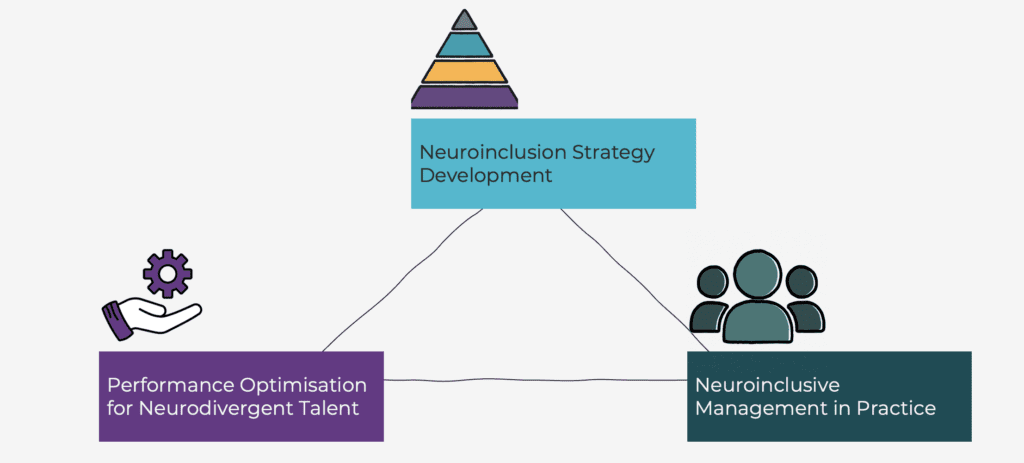
We pride ourselves on being:
Proactive and cost effective
Addressing systemic barriers upstream enables you to design-in neuroinclusion at the group level, so that costs are predictable and planned.
Data driven
We use data on the strengths, challenges and experiences of your own people to co-design the solutions that are right for you.
Expert and tailored
Our highly qualified psychologists combine professional expertise with lived experience. Your dedicated psychologist will take the time to get to know you.
Scalable
We work with organisations of all sectors, shapes and sizes in the UK and globally.
Integrated
Our consultancy services can be easily integrated with other Genius Within services, providing comprehensive support at an individual, team and organisation level.
